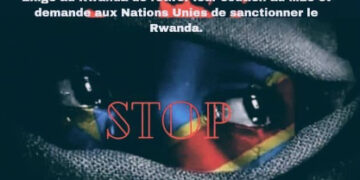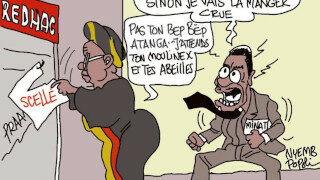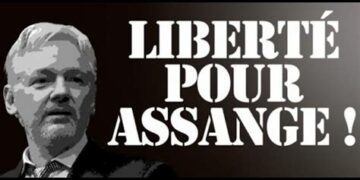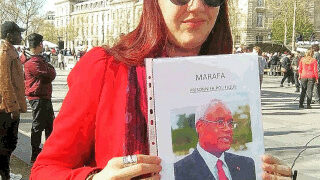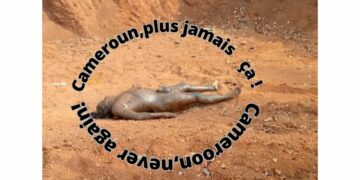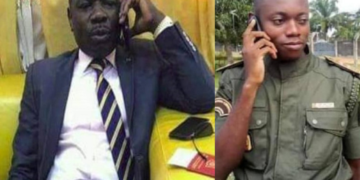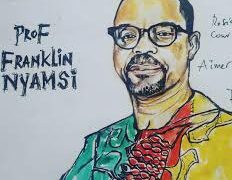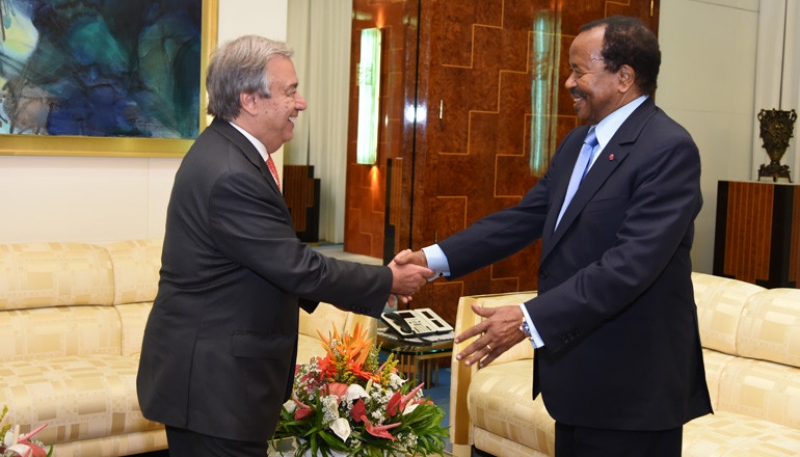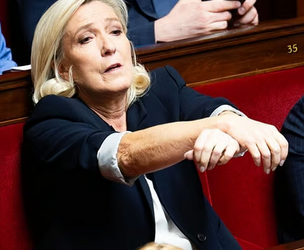Le Cameroun est véritablement comme la Corée du nord des KIM….Un pays maintenu sous un immobilisme moyenâgeux et étouffant depuis 35 interminables années, secoué désormais par toutes les crises (sociale, économique, institutionnel, sécessionniste…). Mais où les quelques rares et illustres visiteurs sont cantonnés au même cérémonial:
– audience de quelques minutes avec le tyran (lui-même en court séjour dans ce pays)
– verbiage inconsistant devant les cameras de sa télévision nationale
– puis remise de décorations et autres cadeaux (souvent les mêmes) par un dictateur qui, bien qu’éprouvant désormais de réelles difficultés de mobilité (à 85 ans quand même), veut d’abord donner l’illusion à l’opinion publique d’une grande fraîcheur physique et d’une activité débordante au contact des grands de ce monde.
Lire aussi : Paul Biya a reçu le SG de l’ONU Antonio Guterres au Palais de l’Unité
En réalité rien ne s’y passe, et rien ne bouge!
– Les réfugiés camerounais fuyant la répression militaire dans les régions anglophones s’accumulent au Nigeria voisin.
– L’extrême nord est toujours sous la menace permanente des terroristes de Boko Haram, qui en contrôlent parfois quelques localités.
– Les prisonniers d’opinions notamment anglophones croupissent dans les mouroirs de la république, pendant que les millions de camerounais manquent de tout y compris manger à leur faim tous les jours…
Il n’empêche comme dans la Corée du Nord des Kim, Paul Biya est un personnage figé et impassible depuis 1982, dans son portrait officiel comme dans sa mauvaise gouvernance chronique. Rien et absolument rien de doit le contrarier.
Longue vie au Cameroun de Paul BIYA
Joël Didier Engo, Président du CL2P
[spacer style="1"]
Over 2,000 refugees have fled Cameroon to Nigeria in past two weeks – U.N. agency
ABUJA (Reuters) – More than 2,000 people have fled southern Cameroon and entered Nigeria over the past two weeks, fallout from renewed oppression of Angolophone Cameroonians in the predominantly French-speaking country, the United Nations refugee agency said on Thursday.
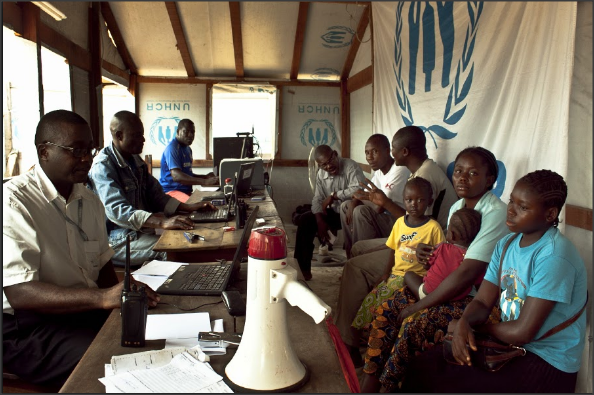 The United Nations High Commissioner for Refugees (UNHCR) is now preparing a “very conservative” contingency plan for as many as 40,000 people fleeing Cameroon, Antonio Jose Canhandula, the agency’s representative to Nigeria, told Reuters in an interview in Abuja.
The United Nations High Commissioner for Refugees (UNHCR) is now preparing a “very conservative” contingency plan for as many as 40,000 people fleeing Cameroon, Antonio Jose Canhandula, the agency’s representative to Nigeria, told Reuters in an interview in Abuja.
A cycle of state repression fuelling separatism has raised concerns the majority French-speaking Cameroon may face a prolonged period of violence, after soldiers shot dead at least eight people in the country’s two English-speaking regions on Oct 1.
“Our fear is that the 40,000 might actually be an understatement in a situation where the conflict might continue,” said Canhandula.
Cameroon’s government “has sent security forces into southern Cameroon,” he said, adding that the country has now closed its borders with Nigeria.
Demonstrations in Cameroon’s English-speaking regions began nearly a year ago when Anglophone lawyers and teachers protested against having to work in French, saying it showed the wider marginalisation of the English-speaking minority.
One of Cameroon’s English-speaking regions in the country’s west borders Nigeria’s southeastern state of Cross Rivers. There, the UNHCR has been registering refugees, some of whom say they are fleeing violence, according to Canhandula.
But Nigeria and Cameroon are already grappling with one of the world’s worst humanitarian crises, in the Lake Chad region, with over 2 million people displaced after more than eight years of conflict with Islamist insurgency Boko Haram.
“Can you imagine having another refugee situation in a country where we are hardly coping with IDPs (internally displaced persons)?” Canhandula said.
“Every time you have a refugee situation you have it for several years… Cameroon really has to take the issues that create the feeling of exclusion very seriously,” he said.
Cameroon’s linguistic divide is a legacy of World War One, when the League of Nations divided the former German colony of Kamerun between allied French and British victors.


